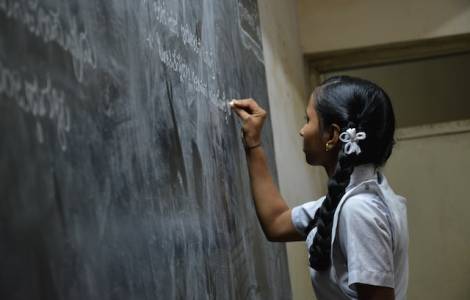
Foto Nikhita S - Unsplash
New Delhi (Agenzia Fides) - In Muzaffarnagar, in the Indian state of Uttar Pradesh, a school teacher slapped a Muslim child in her class and asked the other children in the class to do the same. In Delhi, a 14-year-old boy cut his teacher's throat for sexually abusing and blackmailing him. In the Bani region of Jammu-Kashmir, a high school student was beaten by her teacher and principal for writing on the blackboard a verse praising the god Rama. These are just a few of the incidents that have made headlines in India in recent weeks and sparked debate over what many are calling the "crisis" of India's education system. A clear indicator is the rush to pursue higher education abroad, as state education is poor in most parts of India. These are the themes covered by this year's National Teachers' Day, which has been celebrated in India on September 5th since 1962.
The date was chosen to commemorate Sarvepalli Radhakrishnan, an eminent Indian philosopher, scholar and statesman who was the first Vice President and second President of modern India. As part of the day of action, schools and educational institutions organize special events to honor teachers. Teachers are given gifts, flowers and other tokens of appreciation. Students participate in cultural programs and give speeches to thank their teachers. The day is also an opportunity to reflect on the importance of teachers in society because "they help children and young people to learn and grow as human beings and deserve respect and recognition", according to a statement from the Indian government. "Teachers," it continues, "are the builders of our country's future, as they impart to the students the knowledge and wisdom to lead a responsible life. Teachers' Day helps highlight their role, their status and to highlight their rights in society". The day of action is also food for thought for the Catholic faith community in India, which is heavily involved in education and provides quality education in elementary, middle and high schools. "The so-called 'National Education Policy' seems designed to cater to a particular section of society and leave the poor and marginalized in a system that condemns them to a life of uneducated servitude," Jesuit Cedric Prakash notes to Fides, who invites us to reconsider the "fundamentals and ethics of education". "Today the role of the teacher as caregiver, companion, mentor, motivator and inspirer is severely weakened. The teacher is no longer an 'educator' in the full and complete sense of the word. Besides teaching, he has a whole range of other (administrative and even political) 'duties' that have nothing to do with his primary role and responsibility as an educator. That is why more and more teachers are abandoning their only task today, and that is a worrying one," said Father Prakash. On "Teachers' Day", the Jesuit recalls that Sarvepalli Radhakrishnan (1888-1975) advocated an inclusive, pluralistic and holistic education, which is key to India's meaningful development, and makes a connection to another symbolic event: Mother Teresa of Calcutta died on September 5, 1997 and her feast is celebrated on the same day. Her first task, which she took on in 1931 after her profession in the Congregation of the Missionary Sisters of Our Lady of Loreto, was teaching at the "St. Mary's Bengali Medium School for girls in Calcutta. "She accepted this task with great love and dedication," says the Jesuit, "until in 1948 she left the Sisters of Loreto to found the Missionaries of Charity. With words and the testimony of her life, she proved to be a teacher par excellence. She was convinced that it was necessary to teach the poor children in the slums and above all she realized that she had to transmit to the world the love of Jesus who was the Master and Teacher for her, as a person and as a teacher Mother Teresa embodied values such as "compassion, courage and commitment".
"If Mother Teresa has any core competency," the religious continues, "it is certainly being a compassionate human being. She embodied that value in a way few people will ever be able to do; her love for the marginalized and vulnerable, for the left behind and exploited, and especially for the poorest of the poor, knew no bounds. It was compassion for others that prompted her to found the Missionaries of Charity". Furthermore, "it takes courage to answer to a call from God and Mother Teresa demonstrated that value on numerous occasions. As a young European, she left her country to minister in India. Life in India was not easy, and yet she decided herself for a harder life by literally pitching 'her tent' among the poorest of the poor in the slums of Calcutta. She faced many obstacles in her life but she faced them and proved that she was truly a woman of substance. She was truly a courageous woman". Finally, the Jesuit states: "Mother Teresa did not look back. Her commitment to the cause to which she dedicated her life was complete. She never gave up in the face of difficulties, knowing that her God would not let her down. She gave her life to the end. This unwavering devotion also became a hallmark of her approach". "Today, more than ever - concludes Father Prakash - our country cries out for compassion, courage and commitment. Mother Teresa was a complete teacher. Through her simple and selfless lifestyle, in a humble way, she taught the world the need and importance of embracing these non-negotiable and forever values. Today, on the feast of Mother Teresa, we entrust to her in a special way all the teachers of our country and do our best to embody the values she taught us, to make Indian society compassionate, courageous and committed". (PA) (Agenzia Fides, 5/9/2023)